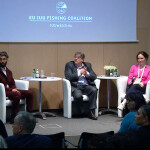The Solidarity Center yesterday explained why it declined to identify the shrimp processing plants it cited in its 40-page report documenting extensive labor abuse in Southeast Asia's shrimp industry.
For the "The True Cost of Shrimp," the Washington, D.C., human rights organization interviewed workers at 15 shrimp processing facilities in Thailand and 10 in Bangladesh. But it named only one of the plants, Ranya Paew, which Thai authorities raided in September 2006 for multiple labor violations. Instead, the U.S. importers and retailers that source shrimp from the plants, including Costco, Trader Joe's and Wal-Mart, were identified.
"Our primary concern is the security and well being of the workers involved in this study. We want to avoid a situation where facilities are shut down, workers are fired and worker-rights advocates are endangered in an attempt to suppress rather than address the industry's problems," says Joan Welsh, communications program officer for the Solidarity Center's Global Outreach Department.
"We also do not want to release information that could be used by U.S. retailers or importers to abandon particular plants," she adds. "Closing factories is often nothing more than a public relations tactic that enables retailers and importers to claim they have addressed broader problems in the industry. Our experience over the years on these issues has taught us that abandoning suppliers is very rarely an appropriate solution.
"We have had a lot of feedback about the report, mostly from worker-rights advocates and anti-trafficking groups. We also have had feedback from industry groups and private institutions," says Welsh.
Thai and Bangladeshi shrimp industry officials and the Global Aquaculture Alliance are at odds with the report's findings.
In a May 9 letter addressed to Timothy Ryan, regional program director-Asia/Europe for the Solidarity Center, the National Fisheries Institute requested a meeting with the report's authors.
"NFI's members are uniquely positioned to bring about positive change, where situations of mistreatment have been identified," said NFI President John Connelly in the letter.
"NFI is anxious to solve specific and identifiable problems in the shrimp or broader seafood industry. Those solutions are best started by digging into the specifics of allegations," he explained. "Absent that kind of specificity, it is difficult to pinpoint where laws are not being enforced. It also tars the plants with excellent operations and reputations with the same brush as those committing odious abuses."





